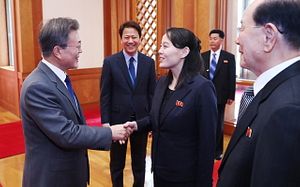Events over the past few days have confirmed a dramatic shift in how South Korea, the United States, and the international community at large are dealing with North Korea. Maximum pressure defined relations with Pyongyang during 2017, most notably through the escalation of sanctions and open discussion about a possible “bloody nose” strike. Engagement is poised to define relations with the Kim Jong-un regime in 2018, with the first inter-Korean summit in over a decade and, potentially, the first-ever meeting between a sitting U.S. president and the leader of North Korea taking place in the coming months. Among the many factors explaining this shift, one stands out: South Korean President Moon Jae-in’s laser-like focus in putting engagement and cooperation at the center of relations with Pyongyang.
After a decade of conservative rule in South Korea, Moon is taking a page from his liberal predecessors who also favored engagement. Former presidents Kim Dae-jung (in office 1998 to 2003) and Roh Moo-hyun (2003-2008) followed a “Sunshine Policy” focused on economic, cultural, and people-to-people exchanges as a means to induce reform and opening up in North Korea. However, Moon is aware of the criticisms that Korean conservatives – and many liberals – have laid on this policy over the years, and is determined to avoid them. Thus, Seoul has refrained from offering Pyongyang any concessions prior to the upcoming inter-Korean summit. Economic aid has been kept to a minimum, even though Moon ran on a platform calling for its resumption. The Sunshine Policy suffered a backlash when it was discovered that the Kim Jong-il government had received $500 million just prior to the summit with then-President Kim Dae-jung, which calls for caution in providing aid to North Korea. Also, the summit next month will be held in Panmunjom, a neutral venue. Moon does not want a picture of him going to Pyongyang at this stage, which could be portrayed as South Korea bowing to its northern neighbor and its nuclear program.
Furthermore, the Moon government is working to make sure that engagement has international and domestic support. At the international level, Moon and other government officials have gone out of their way to court U.S. President Donald Trump and praise his maximum pressure policy as key to North Korea’s call for summits with the United States and South Korea. Indeed, Seoul has repeatedly stated that sanctions remain part of its toolkit to deal with Pyongyang – providing explicit support to Washington’s approach. Roh Moo-hyun’s government suffered from poor relations with the George W. Bush administration. This stifled continuation of the Sunshine Policy during his presidency. Moon wants to avoid this mistake. Seoul probably did not expect Trump to agree to a summit with Kim Jong-un so quickly, but it is clear that the Moon government was working toward setting up the conditions to make this happen in consultation with U.S. officials.
At the domestic level, engagement has broad support after two conservative presidencies, which dismantled inter-Korean engagement without preventing North Korean provocations or its acquisition of nuclear weapons. Moon has even received a boost in public opinion polls in recent days, to a large extent thanks to the widespread perception that his overture to Pyongyang has already calmed down tensions in the Korean Peninsula. But the Korean government is working on having as many conservatives as possible on board by insisting that engagement is ultimately contingent on Pyongyang’s good behavior. In fact, Moon and his special envoys to Pyongyang – national security adviser Chung Eui-yong and intelligence chief Suh Hoon – can be considered relatively conservative in terms of their approach to South Korean security. They probably sincerely believe that engagement is one of the many options to deal with Kim Jong-un, but not the only one.
The caution with which the Moon government is approaching engagement, however, should not distract from the fact that the president wants to create a new framework for inter-Korean relations based on engagement and, crucially, that will outlast his presidency. The president is on a mission to reshape the strategic calculus in the Korean Peninsula. This explains why he has sought a summit with the Kim regime early in his five-year term in office. His government will have four years to implement any agreement reached during the April inter-Korean summit, meaning that the next South Korean president will not find it easy to renege on it. In contrast, the agreement between Roh Moo-hyun and Kim Jong-il following their June 2007 summit was dead in the water as soon as Lee Myung-bak won a decisive victory in the election held only six months later. By the time the next president is elected, four years of cooperation under Moon will be difficult to reverse.
Furthermore, Moon seems bent on creating a legacy that puts South Korea firmly in the driving seat of Korean Peninsula affairs. Conservatives in the country sometimes seem to be more interested in managing the alliance with the United States at the expense of improving inter-Korean relations. This can lead to a degree of bypassing of South Korea in the latter. By holding the summit in Panmunjom, Moon is opening the door to more regular summits in a neutral venue. By establishing the first-ever direct communication line between the leaders of the two Koreas, his government is opening a hitherto nonexistent channel to quickly diffuse tensions. And by very possibly restarting economic engagement, Seoul is testing how sincere Kim Jong-un is in his economic reform push – and the extent to which South Korea can support it and benefit from it. In other words, Moon is developing a quasi-permanent framework for use by future presidents. This could be the most important part of his legacy.
Dr. Ramon Pacheco Pardo is Korea Chair at the Institute for European Studies of Vrije Universiteit Brussel and Senior Lecturer at King’s College London.

































